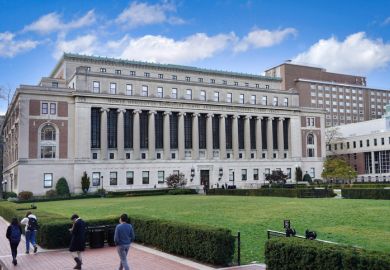The recommendation, which would leave universities free to charge fees as high as they liked, comes in a report from the Institute of Economic Affairs, which describes itself as a “free market thinktank”.
The report says that universities could finance their lending to students by borrowing, or by selling their rights “to the graduate equity income stream” to private investors such as pension funds. The report is written by Peter Ainsworth, the managing director of EM Applications, which advises investment managers.
Pam Tatlow, chief executive of the Million+ group of newer universities, said the report’s proposals “would effectively mean privatising universities and prioritising those students who will generate the highest economic return”.
Mr Ainsworth was behind a previous proposal to uncap tuition fees and have them paid by private investors in return for a portion of a graduate’s salary.
Eric Thomas, vice-chancellor of the University of Bristol, highlighted that scheme to David Willetts, who was then universities and science minister, in an email in March 2011.
Mr Ainsworth had been asked by the Russell Group to write up his ideas in that 2011 document, although he did not receive any funding.
The IEA report, titled Universities challenged: funding higher education through a free-market ‘graduate tax’, says its proposals would ensure that universities “have a much stronger interest in the employability of their graduates” by giving institutions an incentive to improve their graduates’ future earnings.
The scheme has parallels with the plan favoured by Mr Willetts in his time in office, for universities to be given the chance to buy the debt of their graduates.
“Universities should individually or collectively offer contracts to their students, who would agree to pay to the university they attended a given percentage of their earnings,” says Mr Ainsworth in his IEA report.
It adds: “Essentially, the university would be taking an equity interest in the graduate premium earned by the student, although any student who chose to do so could, alternatively, pay the full fees up-front prior to beginning their studies.”
The report also says that “a university, acting alone or with a group of other universities, could choose to sell its future income rights to investors through the process of ‘securitisation’. The better the investors perceive the educational programme of the institution and the prospects of its graduates, the higher the price they would pay for the securities.”
When universities entered such a scheme “all regulation of fees, admissions and other aspects of undergraduate provision should cease”, says the report.
The “burden on the taxpayer” from higher education “would be significantly reduced and perhaps eliminated entirely”, it also says.
Sally Hunt, the University and College Union general secretary, said: ‘The proposed levy would incentivise universities to offer courses with the highest financial returns, leading to a narrower range of subjects for study. This is bad for student choice and the resilience of our economy.”
Register to continue
Why register?
- Registration is free and only takes a moment
- Once registered, you can read 3 articles a month
- Sign up for our newsletter
Subscribe
Or subscribe for unlimited access to:
- Unlimited access to news, views, insights & reviews
- Digital editions
- Digital access to THE’s university and college rankings analysis
Already registered or a current subscriber? Login




